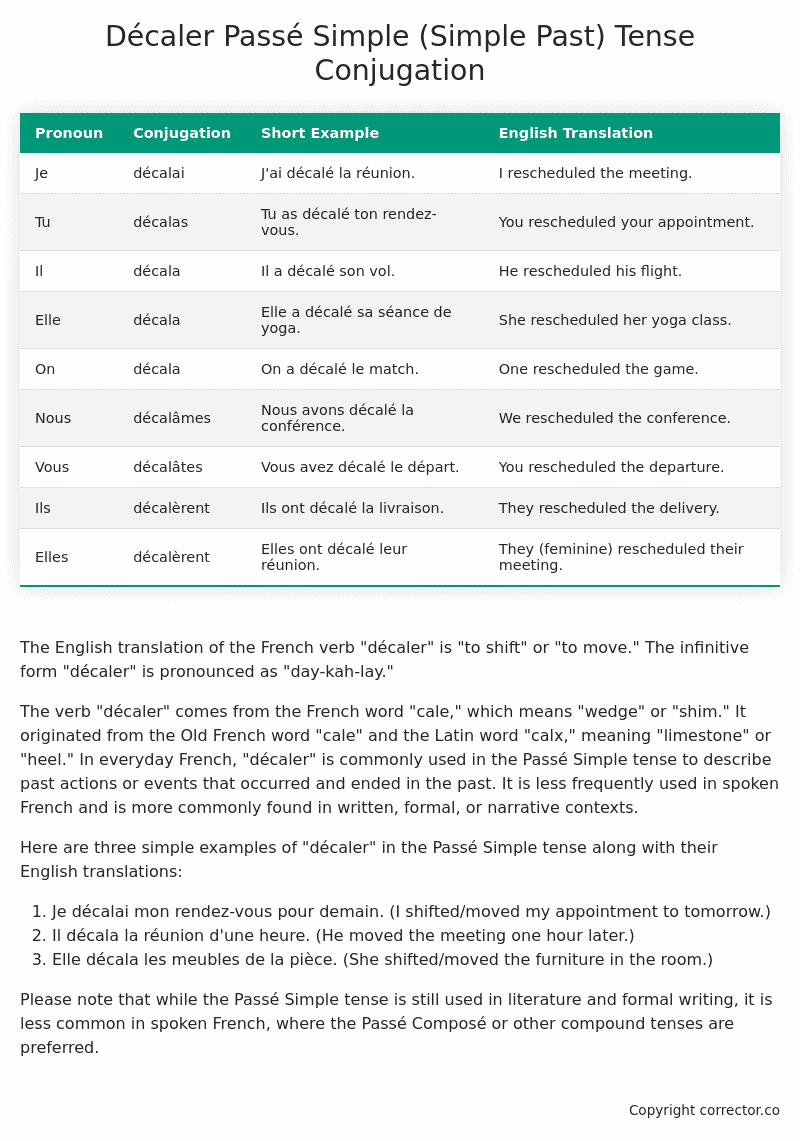Passé Simple (Simple Past) Tense Conjugation of the French Verb décaler
Introduction to the verb décaler
The English translation of the French verb “décaler” is “to shift” or “to move.” The infinitive form “décaler” is pronounced as “day-kah-lay.”
The verb “décaler” comes from the French word “cale,” which means “wedge” or “shim.” It originated from the Old French word “cale” and the Latin word “calx,” meaning “limestone” or “heel.” In everyday French, “décaler” is commonly used in the Passé Simple tense to describe past actions or events that occurred and ended in the past. It is less frequently used in spoken French and is more commonly found in written, formal, or narrative contexts.
Here are three simple examples of “décaler” in the Passé Simple tense along with their English translations:
- Je décalai mon rendez-vous pour demain. (I shifted/moved my appointment to tomorrow.)
- Il décala la réunion d’une heure. (He moved the meeting one hour later.)
- Elle décala les meubles de la pièce. (She shifted/moved the furniture in the room.)
Please note that while the Passé Simple tense is still used in literature and formal writing, it is less common in spoken French, where the Passé Composé or other compound tenses are preferred.
Table of the Passé Simple (Simple Past) Tense Conjugation of décaler
| Pronoun | Conjugation | Short Example | English Translation |
|---|---|---|---|
| Je | décalai | J’ai décalé la réunion. | I rescheduled the meeting. |
| Tu | décalas | Tu as décalé ton rendez-vous. | You rescheduled your appointment. |
| Il | décala | Il a décalé son vol. | He rescheduled his flight. |
| Elle | décala | Elle a décalé sa séance de yoga. | She rescheduled her yoga class. |
| On | décala | On a décalé le match. | One rescheduled the game. |
| Nous | décalâmes | Nous avons décalé la conférence. | We rescheduled the conference. |
| Vous | décalâtes | Vous avez décalé le départ. | You rescheduled the departure. |
| Ils | décalèrent | Ils ont décalé la livraison. | They rescheduled the delivery. |
| Elles | décalèrent | Elles ont décalé leur réunion. | They (feminine) rescheduled their meeting. |
Other Conjugations for Décaler.
Le Present (Present Tense) Conjugation of the French Verb décaler
Imparfait (Imperfect) Tense Conjugation of the French Verb décaler
Passé Simple (Simple Past) Tense Conjugation of the French Verb décaler (You’re reading it right now!)
Passé Composé (Present Perfect) Tense Conjugation of the French Verb décaler
Futur Simple (Simple Future) Tense Conjugation of the French Verb décaler
Futur Proche (Near Future) Tense Conjugation of the French Verb décaler
Plus-que-parfait (Pluperfect) Tense Conjugation of the French Verb décaler
Passé Antérieur (Past Anterior) Tense Conjugation of the French Verb décaler
Futur Antérieur (Future Anterior) Tense Conjugation of the French Verb décaler
Subjonctif Présent (Subjunctive Present) Tense Conjugation of the French Verb décaler
Subjonctif Passé (Subjunctive Past) Tense Conjugation of the French Verb décaler
Subjonctif Imparfait (Subjunctive Imperfect) Tense Conjugation of the French Verb décaler
Subjonctif Plus-que-parfait (Subjunctive Pluperfect) Tense Conjugation of the French Verb décaler
Conditionnel Présent (Conditional Present) Tense Conjugation of the French Verb décaler
Conditionnel Passé (Conditional Past) Tense Conjugation of the French Verb décaler
Conditionnel Passé II (Conditional Past II) Tense Conjugation of the French Verb décaler
L’impératif Présent (Imperative Present) Tense Conjugation of the French Verb décaler
L’impératif Passé (Imperative Past) Tense Conjugation of the French Verb décaler
L’infinitif Présent (Infinitive Present) Tense Conjugation of the French Verb décaler
L’infinitif Passé (Infinitive Past) Tense Conjugation of the French Verb décaler
Le Participe Présent (Present Participle) Tense Conjugation of the French Verb décaler
Le Participe Passé (Past Participle) Tense Conjugation of the French Verb décaler
Struggling with French verbs or the language in general? Why not use our free French Grammar Checker – no registration required!
Get a FREE Download Study Sheet of this Conjugation 🔥
Simply right click the image below, click “save image” and get your free reference for the décaler Passé Simple tense conjugation!

Décaler – About the French Passé Simple (Simple Past) Tense
Formation
Usage
Narration
Historical Context
Interactions with other tenses
Passé Composé
Imparfait
Conditional and Subjunctive
Summary
I hope you enjoyed this article on the verb décaler. Still in a learning mood? Check out another TOTALLY random French verb conjugation!


